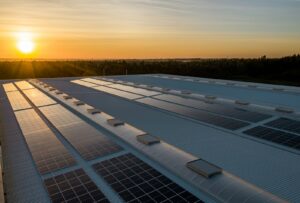Energy firm Drax has announced a partnership with Econic Technologies to explore new potential uses for captured carbon dioxide from the biomass power generation at its Selby plant.
Econic Technologies will test the CO2 being captured from Drax’s Bioenergy with Carbon Capture and Storage (BECCS) pilot at its own industrial pilot facility, to assess its suitability for producing polymers used in plastic products.
It’s claimed that Econic’s catalyst technology could save as much as the equivalent of four million petrol cars’ worth of CO2 every year.
A new pilot plant has also been installed at the power station in North Yorkshire, by Deep Branch Biotechnology to explore the feasibility of using Drax’s CO2 emissions to make proteins for sustainable animal feed products, technology which could enable the agricultural sector to decarbonise.
Will Gardiner, Drax Group CEO said: ‘Drax’s ambition is to be carbon negative by 2030. Having pioneered the use of sustainable biomass, Drax now produces 12% of the UK’s renewable electricity. With the right negative emissions policy for BECCS, we can do much more, removing millions of tonnes of emissions from the atmosphere each year.
‘By working with innovative tech companies like Econic and Deep Branch Biotechnology, we are exploring new opportunities for clean growth, which could be critical not only for beating the climate crisis, but also in enabling a just transition, protecting jobs across the North – delivering for the economy and the environment.’
At the December COP25 climate change conference in Madrid, Drax said they want their power station in Selby to be ‘carbon negative’ by 2030.
However, they said their ambition is only achievable with an investment framework into BECCS as government subsidies for the plant are already around £2m a day.
In October, energy minister Andrea Leadsom approved plans for Drax Power to install four new gas turbines in North Yorkshire, overturning a decision by the UK’s Planning Inspectorate.
Last week, Environmental lawyers ClientEarth launched a legal challenge against Ms Leadsom’s decision, saying it: ‘Undermines the UK’s path to reducing carbon emissions and building a more sustainable energy sector.’
Photo Credit – Drax















